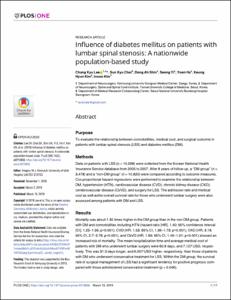KUMEL Repository
1. Journal Papers (연구논문)
1. School of Medicine (의과대학)
Dept. of Neurosurgery (신경외과학)
Influence of diabetes mellitus on patients with lumbar spinal stenosis: A nationwide population-based study
- Keimyung Author(s)
- Lee, Chang Kyu; Kim, In Soo
- Department
- Dept. of Neurosurgery (신경외과학)
- Journal Title
- PLoS One
- Issued Date
- 2019
- Volume
- 14
- Issue
- 3
- Abstract
- Purpose
To evaluate the relationship between comorbidities, medical cost, and surgical outcome in patients with lumbar spinal stenosis (LSS) and diabetes mellitus (DM).
Methods
Data on patients with LSS (n = 14,298) were collected from the Korean National Health Insurance Service database from 2005 to 2007. After 8 years of follow-up, a “DM group” (n = 3,478) and a “non-DM group” (n = 10,820) were compared according to outcome measures. Cox proportional hazard regressions were performed to examine the relationship between DM, hypertension (HTN), cardiovascular disease (CVD), chronic kidney disease (CKD), cerebrovascular disease (CbVD), and surgery for LSS. The admission rate and medical cost as well asthe overall survival rate for those who underwent lumbar surgery were also assessed among patients with DM and LSS.
Results
Mortality was about 1.35 times higher in the DM group than in the non-DM group. Patients with DM and comorbidities including HTN (hazard ratio [HR], 1.40; 95% confidence interval [CI], 1.25–1.56; p<0.001), CVD (HR, 1.53; 95% CI, 1.36–1.73; p<0.001), CKD (HR, 3.18; 95% CI, 2.7–3.76; p<0.001), and CbVD (HR, 1.69; 95% CI, 1.49–1.91; p<0.001) showed an increased risk of mortality. The mean hospitalization time and average medical cost of patients with DM who underwent lumbar surgery were 60.8 days, and 7,127 USD, respectively. This was 31.3 days longer, and 6,207 USD higher, respectively, than those of patients with DM who underwent conservative treatment for LSS. Within the DM group, the survival rate of surgical management of LSS had a significant tendency for positive prognosis compared with those administered conservative treatment (p = 0.046).
Conclusions
In patients with LSS, DM was associated both with poor prognosis (most significantly in those with CKD), and increased medical cost in those who underwent surgery. Nevertheless, surgical treatment for LSS in patients with DM was related to favorable prognosis compared
with conservative treatment.
- Publisher
- School of Medicine (의과대학)
- Citation
- Chang Kyu Lee et al. (2019). Influence of diabetes mellitus on patients with lumbar spinal stenosis: A nationwide population-based study. PLoS One, 14(3), e0213858–e0213858. doi: 10.1371/journal.pone.0213858
- Type
- Article
- ISSN
- 1932-6203
- Source
- https://journals.plos.org/plosone/article?id=10.1371/journal.pone.0213858
- Appears in Collections:
- 1. School of Medicine (의과대학) > Dept. of Neurosurgery (신경외과학)
- 파일 목록
-
-
Download
 oak-2019-0083.pdf
기타 데이터 / 815.2 kB / Adobe PDF
oak-2019-0083.pdf
기타 데이터 / 815.2 kB / Adobe PDF
-
Items in Repository are protected by copyright, with all rights reserved, unless otherwise indicated.